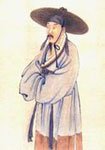《风雨》陆游 翻译、赏析和诗意
《风雨》是宋代陆游创作的一首诗词。以下是这首诗词的中文译文、诗意和赏析:
风雨从北来,
The wind and rain come from the north,
万木皆怒号,
All the trees roar in anger,
入夜殊未止,
As night falls, they show no signs of stopping,
声乱秋江涛。
Their sounds mingle with the waves of the autumn river.
渺然老书生,
I, a lonely old scholar,
白头卧蓬蒿,
With white hair, lie among the wild grass,
闭门不敢出,
Afraid to venture outside my closed door,
裂面风如刀。
The wind cuts through my weathered face like a knife.
邻人闵我寒,
My neighbors pity my coldness,
墙头过浊醪;
They pass me muddy wine over the wall;
时哉一昏醉,
In such moments, I get drunk in a daze,
新橙宜蟹螯。
Fresh oranges pair well with crab claws.
这首诗词描绘了风雨的景象,表达了作者内心的孤独和无奈。风雨的威力使得大自然万物都感到愤怒,而作者则像一位渺小的老书生,白发苍苍地躺在荒草丛中。他闭门不敢出,面对狂风刮过他的脸颊,仿佛刀割一般。邻人们对他的寒冷表示同情,透过墙头传来的浊醪酒,他在醉意中感受到一丝温暖。最后,作者提到新鲜的橙子和蟹螯的搭配,暗示着生活中的美好和享受。
这首诗词通过自然景象的描写,表达了作者内心的孤独和无奈,以及对生活中美好事物的渴望。同时,通过对邻人的描写,展现了人情温暖和互助的一面。整首诗词以简洁的语言表达了复杂的情感,给人以深思。
《风雨》陆游 拼音读音参考
fēng yǔ
风雨
fēng yǔ cóng běi lái, wàn mù jiē nù háo, rù yè shū wèi zhǐ, shēng luàn qiū jiāng tāo.
风雨从北来,万木皆怒号,入夜殊未止,声乱秋江涛。
miǎo rán lǎo shū shēng, bái tóu wò péng hāo, bì mén bù gǎn chū, liè miàn fēng rú dāo.
渺然老书生,白头卧蓬蒿,闭门不敢出,裂面风如刀。
lín rén mǐn wǒ hán, qiáng tóu guò zhuó láo shí zāi yī hūn zuì, xīn chéng yí xiè áo.
邻人闵我寒,墙头过浊醪;时哉一昏醉,新橙宜蟹螯。
“白头卧蓬蒿”平仄韵脚
拼音:bái tóu wò péng hāo
平仄:平平仄平平
韵脚:(平韵) 下平四豪
